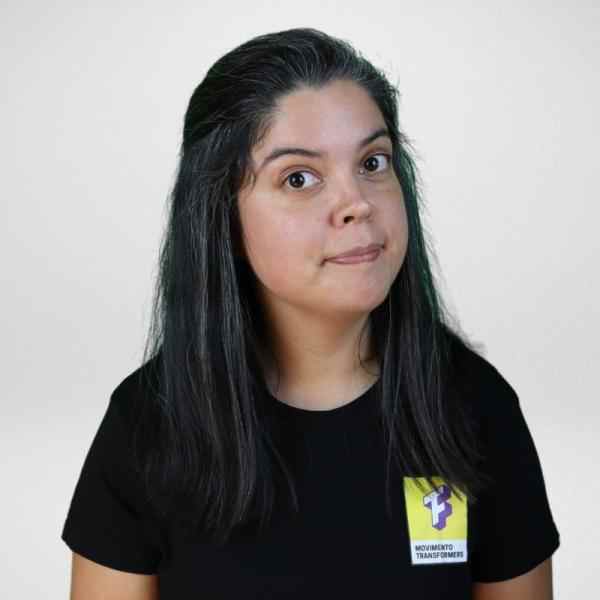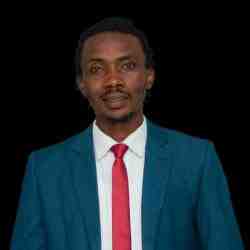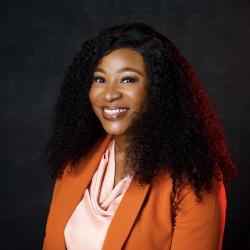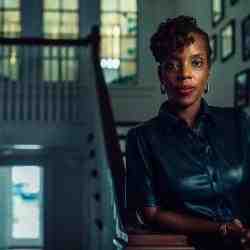Introduction
Joana envisions a society in which all young people are central to creating more empowered communities. To make this happen, she is building a national movement of engaged young people who lead their own changemaking journeys by doing what they most love to do.
The New Idea
Young people have an innate desire to participate in civil society and make the world a better place, but few find opportunities that motivate and convince them. Volunteering as a form of youth participation in society is typically a first step, yet youth volunteering in Portugal has halved in the last decade.
Joana has demonstrated that, if we are able to capture young people’s interest and instrumentalise their intrinsic motivation, volunteering and associationism act as steppingstones to effective youth participation and as key levers to build a society of changemakers. With Movimento Transformers, Joana has therefore created a new framework where young people proactively select, co-create, work together, and decide where they wish to do changemaking for the good of all, with a special focus on the most vulnerable.
In Joana’s framework the youth have the power to choose how to become involved through what they love doing most: learning a desired new skill (sports, painting, musical instruments, dance, cooking etc.) in a group of peers and mentors. This is the first step on a changemaking journey where young people are then asked to actively identify problems in their communities and co-create solutions as conceptual and strategic contributions for their learning experiences.
Simultaneously, Joana has created a powerful movement of student and youth associations around Portugal that work with a common purpose and are shifting their role from “Festive committees” who organise parties to “Changemaking communities” that create their own opportunities to address problems they care of.
Through Movimento Transformers, Joana has repositioned the idea of volunteering as a powerful tool to ignite intrinsic motivation, trust, and collective action. She has created networks of young leaders, bringing together student and youth associations around Portugal, and bridging them with local governments. By doing so, she has built and strengthened social capital and enabled participants to act together more effectively.
Joana envisions a society in which all young people are central to creating more empowered communities and where no relevant decision in the public sphere is taken without the participation of the youth. Movimento Transformers has already become an integral part of decision-making in different town halls all around Portugal and the Ministry of Education is currently evaluating how the new framework led by Joana can be integrated into the formal education system and become part of the official curriculum.
Joana has managed to spread her vision throughout Portugal and is now in the phase of scaling up Movimento Transformers to other countries, such as Italy and Cyprus, by building partnerships with strategic allies that will adopt her solution. Moreover, the entire model led by Joana is based on the co-creation and sharing of know-how, which is openly accessible through an online platform to anyone who wants to acquire knowledge on volunteering, associationism, and youth participation, fostering the scaling of her impact even more.
The Problem
In Portugal, there has been a steady decline in active participation in civil society. Indicators range from abstention rates in general elections (from 38.5% in 2006 to 60.5% in 2021) to studies that show drops in activities like volunteering or participation in social organisations. This is increasingly serious, as Portugal is already poorly positioned, being ranked 104 of 140 countries surveyed in the World Giving Index (which considers not only donations but volunteering and social awareness). As a comparison, around four times more people volunteer in the United States than in Portugal.
This passivity is higher amongst the youth and has doubled in the last decade. According to a study carried out in 2018 on the circumstances and attitudes of Portuguese young people, only 5.1% of people between the ages of 15 and 24 were involved in any type of student and youth association, 1.4% participated in voluntary or non-profit associations, and only 1% participated in political parties. In an identical study carried out in 2007, these figures were respectively 11.9%, 7.4% and 5.2%, which reflects a significant drop in associative participation and in volunteering movements and a serious alienation of young people in the face of politics.
This alarming situation is caused by both internal barriers, such as self-doubt, mistrust, and doubts about institutions, and more external issues like the attractiveness of opportunities for youth participation and obsolete regulations. On one hand, younger generations are often less aware of opportunities to create change, relying on “armchair activism.” To exacerbate this, voices of youth are not being heard; two-thirds of young people in Europe feel unhappy with the way cities or towns engage with them and demand that decision-makers involve children and young people in global and local policy dialogues, according to UNICEF and the Euro Child Poll. On the other hand, existing youth participation initiatives are poorly prepared to offer meaningful engagement opportunities to young people. Even formal education systems are too slow to change and reluctant to be seen promoting a “progressive” agenda.
Although volunteering is widely recognized as a key element for creating social awareness and a changemaking mindset, the vast majority of existing initiatives are not fully exploiting this potential, as they offer little room to lead and co-create. Particularly for Gen Z, all the positive changes created by volunteering at the individual and the collective level (including solidarity, social engagement, active citizenship, shared responsibility, and community resilience) occur when the opportunities are proactively selected and found enjoyable, aspects that are not sufficiently central to the youth participation system.
It is also important to note that the participation of the most vulnerable is the least supported and needed, and there are few initiatives aimed at fostering individual and group agency amongst vulnerable youth, despite the demonstrated positive results.
The Strategy
Joanna’s goal is that all young people, especially those coming from vulnerable contexts, have the opportunity to shape their own changemaking experience, promote collective action, be at the centre of decision making, and contribute to society.
To accomplish this, she has developed a strategy based on three key levers that build and strengthen social capital: 1) Igniting trust among youth to promote collective action and collaboration; 2) Creating networks of young leaders to bond and bridge; and 3) Promoting open information and political action.
1) Igniting passion and trust among youth to promote collective action and collaboration.
The main channel for creating trust and enabling the collective action of young people (ages 12 – 20) is the Superpower School. The school inverts the traditional role of beneficiary – who normally receives whatever the mentor has to offer – and allows young people to choose the pathway in which they want to participate (learning sports, painting, musical instruments, dance, cooking etc.). Youth from disadvantaged areas find it difficult to connect with typical mentoring activities like help with homework. However, through Joana's program, they are seduced by the idea of learning what they are attracted.
Joana has designed a pay-back element which is a first step on a changemaking journey and continues to push for group agency and leadership. In return for learning the selected activity, each group of apprentices must present a community project that identifies a local issue and proposes a plan to combat the problem using what they were taught, in order to put it at the service of those in need. Pay-back projects have included from teaching surf lessons to adapted swimming athletes on the beach or giving concerts to raise the awareness of being a marrow donor.
This innovative approach provides changemaking opportunities and achievements to both parts involved – mentors are more fulfilled as they offer something unique to them and attractive to the apprentices and, more importantly, apprentices take on a new role in their communities. The impact of the Superpower School has been independently evaluated by the Faculty of Psychology and Educational Sciences of the University of Porto showing impressive results in terms of social awareness and commitment, which has given credibility for the spread strategy and the dissemination of the project.
To date, the Superpower School has implemented 92 programs in 22 cities across Portugal. There are over 500 fully trained mentors who have worked with over 6,000 apprentices. The impact of the school on both mentors and apprentices are promising: 97% of mentors keep volunteering in the second year of the project, 77% of apprentices continue volunteering in the following two years of the project, 80% of apprentices say they ‘know what to do in life’ as a consequence of their participation, 47% of learners regularly practice the activity they learned, and there is a 44% decrease in the school drop-out rate among apprentices.
2) Creating networks of young active leaders
In parallel, Joana and her team strive to bond and bridge a vast network of youth leaders, through the creation and support of student and youth associations. The AE Lead program offers a yearlong experience for secondary school and university youth (ages 15 – 20) and has been refined with participants over the past three years. The first phase is an inspirational one to spark young people’s interest via a roadshow and a Hackathon, where the team teaches the practical aspects of setting up an association. The second phase is all about training and mentoring sessions. It starts with a Bootcamp to help to define the scope of the association and then offers seven workshops on key skills like teamwork, creativity, leadership, and communication. The third phase is all about collaborative power and celebration. It is a nationwide get-together of all participants where projects are shared.
For those working with youth but not related to the school environment, Joana sets out to change their role with the XLead program, a five-week training experience for individuals or groups. The XLead program is essentially a train the trainers’ model where professionals and volunteers working with vulnerable youth are trained in all aspects of youth involvement, specifically changing their role from passive beneficiaries to active co-creators of associations with social goals.
With the critical mass acquired through AELead and XLead, Joana has created dialogue spaces with public administrations where student and youth associations play an active role. These student and youth councils are instated with the help of Movimento Transformers but are then self-organized in working with each town hall.
AE Lead has been expanded to three Portuguese cities and Joana is working on the fourth edition of Xlead, which has already impacted 12,000 young people working with 30 organizations. They expect to impact 20,000 young people next year. Based on previous editions, 60% of participants have a greater participation in school initiatives, (school assemblies, participation in student associations), whilst 80% have a greater participation in community initiatives (paybacks, local volunteering initiatives, enrolment in the local volunteer bank, participation in local associations).
3) Promoting political action and open and new information
With the validation of the Movimento Transformers’ methodology by the Calouste Gulbenkian Foundation and the close work on local youth policy, Joana is now working in collaboration with the Secretary of State for Youth and Sports and the Ministry of Education to include this model in the school curriculum, directly influencing the policy change. She estimates that her work with the Ministry of Education will culminate in a five-year plan to introduce the Movimento Transformers’ framework within the formal education system. To do this she is learning from other models such as Aprendizaje y Servicio (although Joana’s model focuses more on co-creation and leadership) and the social module of the International Baccalaureate (although Joana’s model focuses on a long-term experience rather than the one-off project in the IB).
Joana is also creating a National Youth Study with the support of the Faculty of Psychology and Educational Sciences of the University of Porto to further understand the reasons behind the low levels of youth participation in Portugal and ensure adequate opportunities in each city. Sharing the results of this study will allow her to make the case for youth participation and then propose dialogue spaces with each town hall. This study, which will be created over the next year, is also expected to serve as a basis to work towards an update in the volunteering laws.
To spread her model beyond the direct action of Movimento Transformers, Joana has created the T-Academy, an open-access online platform for civil society that democratizes all their knowledge and models of changemaking (how to set up a mentoring program, how to create a youth association, skills development, participation opportunities, etc.). Her approach to knowledge sharing will allow the movement to grow easily with the carefully well-chosen partners.
Her success with Movimento Transformers has led her to pilot a replication of the model with other collectives starting with vulnerable older people, since the journey that the youth movement has travelled can easily be replicated with others who are also disconnecting from society. This pilot will run in 2022 and 2023 and is being implemented with organisations who already work with this collective.
Joana has recently orchestrated a significant collaboration with The Body Shop Portugal who has openly recognised Movimento Transformers as the greatest expert in the field of youth participation in the public sphere. They are funding a three-year campaign, started in Portugal but with a global rollout, aimed at amplifying the voice of young people and increasing their participation and representation in public life. This is a key strategic partnership for Joana moving forward.
The Person
Joana is an only child and has always been an excellent student and grew up doing individual activities like playing the piano, or one-to-one art and painting classes. As a very small child she soon realized that activity was of much greater value when done in the company of others. Aged sixteen, she started a volunteering path that took her to several initiatives around Portugal with vulnerable neighbourhoods, disability support groups, or juvenile prisons, which allowed her to understand different communities and different concepts of active citizenship in each of these places. Joana worked with disabled children in a traditional volunteer program with strict guidelines. She discovered that many of the children were interested in music, and with her own talent in music, she worked with them to create a choir group and a system of song selection.
Always focused on empowering communities and inclusive education, she decided to study at the Faculty of Psychology and Educational Sciences of the University of Porto, where she successfully completed a degree and master’s in clinical and Health Psychology.
Joana joined Transformers’ previous incarnation in 2013, aged twenty-three. At the time this was a small, local traditional volunteering organisation that had a breakthrough by attracting kids through a breakdance class founded by a friend of Joana’s named Joao Brites. Joao considered the project a hobby, focussed on simple volunteering, and when he was offered a job in Mexico, he decided to move.
Joana, with her background, however, Joana saw immense value in changing the focus of the project. She had the vision that the volunteering organisation could be a first step to activating the whole youth participation system. She maintained the Superpowers concept but took the organisation forward with a systemic approach based on social capital, rather than the small-scale direct service of Joao. Nine years later, Joana has been responsible for building a powerful youth movement in Portugal.
Joana’s need to generate an impact on people, places, and organizations that contribute to an accessible and inclusive education for all led her to help establish the IES – Social Business School (the first school of social business in Portugal), where she has worked part time as a Program Director and Project Manager, using her experience with youth to impact businesses.
She feels very lucky to have been recognised by the European Commission in 2021 as TOP 100 Women in Social Enterprise. The same year Joana also received the Social Economy Personality Honor Award. The António Sérgio Cooperation and Solidarity Award, created by CASES in 2012, is intended to honour those who have distinguished themselves in the Social Economy sector.




